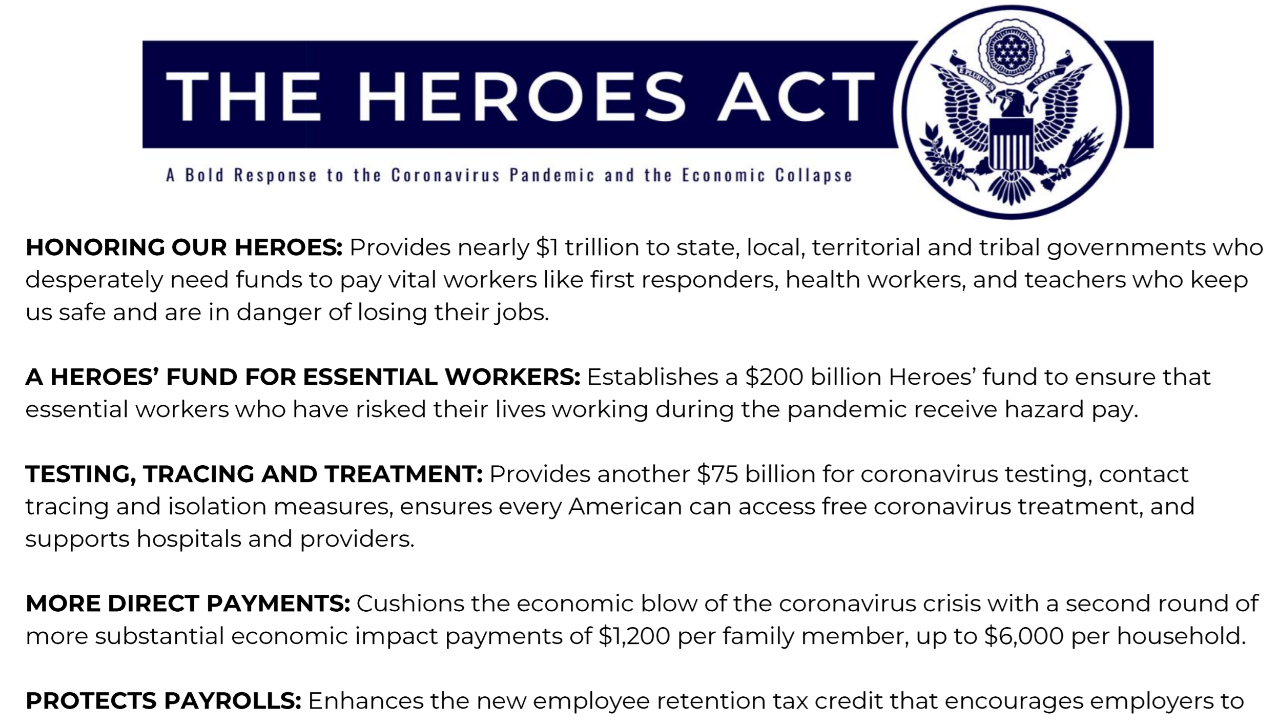[ad_1]

Americans could be getting their second stimulus checks as a new coronavirus relief bill has been introduced. It includes more direct payments of up to $6,000 per household. The new bill is expected to cost more than $3 trillion, making it the biggest emergency relief package in U.S. history.
$3 Trillion Coronavirus Relief Bill
U.S. House Speaker Nancy Pelosi unveiled Democrats’ latest coronavirus relief bill called the Health and Economic Recovery Omnibus Emergency Solutions (HEROES) Act on Tuesday. The 1815-page relief package was introduced by Congresswoman Nita M. Lowey, chairman of the Committee on Appropriations, a House of Representatives committee responsible for passing appropriation bills.
Party leaders are expected to vote Friday on this package, which provides another set of direct cash payments to Americans. Democrats are calling this bill “a bold response to the coronavirus pandemic and the economic collapse.” According to the bill’s summary, one of the proposals reads:
More direct payments: Cushions the economic blow of the coronavirus crisis with a second round of more substantial economic impact payments of $1,200 per family member, up to $6,000 per household.

According to reports, the income thresholds are the same as in the Coronavirus Aid, Relief, and Economic Security (CARES) Act, which was signed into law by President Donald Trump in March. The amount would start to reduce from $1,200 above thresholds of $75,000 and $150,000, respectively.
The bill does not include monthly payments as called for by a number of House progressives, including Rashida Tlaib, Alexandria Ocasio-Cortez, Ilhan Omar and Ayanna Pressley. It also does not include the Paycheck Guarantee Act, another progressive priority aimed at covering 100% of workers’ wages up to $90,000 per year.
In addition to the second round of $1,200 stimulus checks for qualified individuals, the bill also provides nearly $1 trillion to state, local, territorial and tribal governments, $200 billion for hazard pay for essential workers, $75 billion for coronavirus testing and contact tracing, an extension of the $600 per week federal unemployment insurance benefit, and $175 billion in rent, mortgage and utility assistance.

‘No Chance’ of Passing
Some lawmakers strongly believe that this covid-19 relief package will not pass. Sen. John Barrasso, a member of Republican leadership in the chamber, said that the new coronavirus relief bill is dead on arrival, stating: “That will not pass. It’s not going to be supported.” House Minority Leader Kevin McCarthy tweeted that the bill is a “liberal wishlist that was crafted behind closed doors and includes bailouts for blue states and giveaways for billionaires.” He added, “This spectacle has no chance of becoming law … What a waste of taxpayer time.” CNBC detailed:
The new bill is set to cost more than $3 trillion, which easily tops the $2 trillion cost of the late March stimulus package — the biggest emergency spending measure in U.S. history.
One controversial proposal in the bill concerns illegal aliens. Congressman Lance Gooden tweeted, “Nancy Pelosi wants to bail out 14 million illegal aliens in the next round of stimulus spending and give them retroactive payments of $1,200. This so-called Heroes Act is a slap in the face to hard-working Americans who are barely getting by.” Senate Majority Leader Mitch McConnell told reporters Tuesday: “I’m in discussion, we all are with the administration. If we reach a decision along with the administration to move to another phase, that’ll be the time to interact with the Democrats.”
Since the covid-19 crisis began, several bills have been enacted in the U.S. The Coronavirus Preparedness and Response Supplemental Appropriations Act was enacted on March 6, the Families First Coronavirus Response Act on March 18, the CARES Act on March 27, and the Paycheck Protection Program and Health Care Enhancement Act on April 24.
What do you think about this bill and more stimulus checks? Let us know in the comments section below.
Image Credits: Shutterstock, Pixabay, Wiki Commons, U.S. House Committee on Appropriations
Disclaimer: This article is for informational purposes only. It is not a direct offer or solicitation of an offer to buy or sell, or a recommendation or endorsement of any products, services, or companies. Bitcoin.com does not provide investment, tax, legal, or accounting advice. Neither the company nor the author is responsible, directly or indirectly, for any damage or loss caused or alleged to be caused by or in connection with the use of or reliance on any content, goods or services mentioned in this article.
Read disclaimer
[ad_2]
Source link



